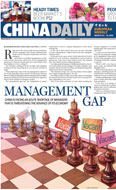Shortage threat to growth
Updated: 2011-03-25 10:21
By Andrew Moody (China Daily European Weekly)
|
 Rick Dai says some of the communication difficulties between managers of different cultural backgrounds can be evidenced in social situations. Zhang Wei / China Daily
|
Chinese managers 'very capable but stifled by corporate environment'
Leading management headhunter Rick Dai says China is facing a critical management shortage that could hold back its economic growth.
The chief executive officer of WISEst Consulting, which runs one of China's largest management recruitment websites, says the problem is getting worse every year.
"The gap will become very serious in the coming year or so. Year by year the gap is becoming become bigger and bigger," he says. "The shortage will certainly not be satisfied in the next three to five years."
In the month after the Chinese New Year, there were 10,000 management jobs posted on the company's website www.lietou.com alone on which 5,000 of China's headhunters are registered.

"If you consider that only a third of management jobs are handled by headhunters, then there were 30,000 management vacancies in the whole of China during that month."
Dai was speaking in the consultancy's offices at JianWai SOHO, one of the most fashionable commercial complexes in Beijing. The company, which has 100 employees, also has bases in Shanghai, Guangzhou and Shenzhen.
He says the shortage of managers means an executive changing job would be expecting to get a pay rise of between 15 and 30 percent.
"Companies are having to pay these sort of salaries to attract talent and in some cases they have to pay 40 to 50 percent more to attract someone," he says.
Dai insists there might be a management gap in terms of a shortage of Chinese managers but not one in terms of talent compared to the management skills available in Europe and the United States.
"Chinese managers are very capable and they are very intelligent and hardworking. If you look at the multinationals in China most of the mid-level executives are Chinese," he says.
However, he says if they do have weaknesses it is usually a result of the environment they have had to work in.
"Through no fault of their own, Chinese managers typically do not have a lot of foreign experience so they are not really familiar with overseas markets, whereas overseas managers in multinational companies might have worked in many different places. This might mean the breadth of vision of Chinese managers is slightly narrower," he says.
Dai majored in business at Sun Yat-Sen University in Guangzhou in southern China before joining US consumer brand giant Procter & Gamble, which has its China headquarters in the same city.
He became a brand manager for products such as Oral B, Ariel washing detergent and Crest toothpaste before co-founding the website, which he joined full time in 2008.
At Procter & Gamble, he says he was aware of cultural differences with some of his colleagues of many different nationalities.
"I think people from European and other Western environments are more direct in their communication. They say what they think without worrying about how it is received.
"Chinese people are often quite modest and often avoid saying what they think. This can lead to things not being resolved. It is not just an East and West difference but it is mainly that."
Dai says some of the communication difficulties between managers of different cultural backgrounds can be evidenced in social situations.
"My English is okay, certainly to do business with someone. I remember, however, having dinner with Westerners and just not understanding the joke. It was not an ability gap, nor an educational one but probably a cultural one."
Dai says many Chinese managers making use of his company's website are looking for opportunities in other parts of China where the cost of living may be lower such as in western China.
"They might be living in Beijing or Shanghai and their annual salary might be 200,000 yuan (22,000 euros), which is quite a high salary in China, but it still might not be enough for them to get on the property ladder. They believe they could achieve a much better standard of living in western China," he says.
Dai says the website gets a lot of managers between the ages of 25 and 35 who feel their careers have stalled. They typically would be on an annual salary between 100,000 yuan and 300,000 yuan.
"They might have been working for a company for three to five years but have reached a bottleneck. They need to wait around for another three years to go to the next level and they feel bored having to do the same work over and over again and they think they might be better opportunities outside."
These could be looking to move to other Chinese or foreign multinationals to advance their careers.
Another group, according to Dai, might actually be working for a major European or international business but believe there are bigger opportunities with an ambitious Chinese company.
These might typically be around 40 and already earn 1 million yuan a year but feel a need to earn significant sums of cash.
"They are often frustrated by the fact that all the major decisions are taken overseas whereas it is they that have the knowledge of what is going on on the ground in their businesses. They know the consumers better, they know the market but they cannot translate any of this into action," says Dai.
Such individuals are likely to be attracted to a Chinese company, which might be considering an IPO (going public with an initial public offering of shares) such as on the New York Nasdaq exchange, which has been the favored route of a number of Chinese companies.
"When these pre-IPO companies want to go forward they want real international quality management so they will give a great offer and we have got a number of clients like this," says Dai.
"They offer share options and such positions are very attractive because the managers will think if they can make a success of it they could make enough money in three years to give them a great lifestyle for the rest of their lives. Everyone in China now is in a rush to become a millionaire."
Chinese companies that have attracted major venture capital funding from Europe or the US are also likely to pay a premium for top managers.
"These companies have the money but not necessarily the management expertise to take them to the next level and are prepared to give a great offer to the right manager. There is a shortage of this type of person in China," he says.
Dai admits that some Chinese companies can be stifling for young ambitious Chinese managers wanting to make a mark.
"If you go into a company with new ideas and wanting to change things as a new junior or middle manager, it would not go down well. You tend to be judged more on how you get on with people and how you build relationships with colleagues, which is a difference with foreign companies," he says.
Dai says many Chinese companies also have a "boss culture" with all the major decisions taken by the man or woman in charge.
"That doesn't have to be a bad thing. If the company has a great leader who is dynamic, the company can grow very fast. The downside is that if he makes a mistake everyone in the organization suffers," he says.
"In European and American businesses, management decisions tend to be taken as a result of market data or research, knowledge-based rather than personal leadership."
Dai says greater provision of management education such as more institutions providing MBA degrees is not the way to address China's management shortage.
"As Chairman Mao Zedong said, practical experience is the most important. I got my own personal MBA actually running my own business here and not from any educational establishment," he says.
E-paper

City of Joy
Welcome to the 'world of smiles' where life meanders slowly.
Preview of the coming issue
Debate on nuclear power revived
The future is now
Specials

Ping-pong Hotel
A ping-pong racket-shaped architecture is planned in East China.

Blasting away floating ice
Bombs are dropped over a section of the Yellow River to blast floating ice.

Beloved polar bear died
Berlin's beloved polar bear Knut, an international star died Saturday.
